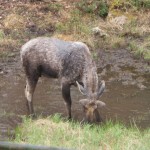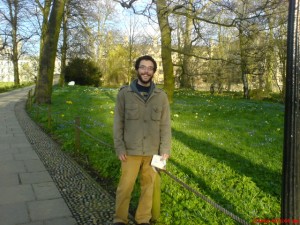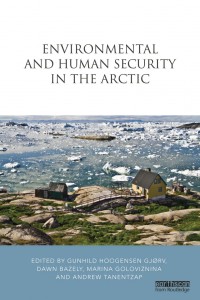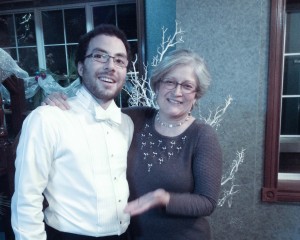The sub-title for this post is: Andrew's main Hobby is doing science all the time!
 Dr. Tanentzap, who is a Lecturer in the Department of Plant Sciences, University of Cambridge, has been very busy in the last couple of weeks, since his latest paper, with Mark Vicari & myself was published in Biology Letters. It's all about how moose spit (drool, saliva) reduces the growth and toxicity of the systemic fungal endophyte in red fescue grass. He's been giving interviews about the research, including to the New Scientist, Science and BBC radio in Cambridge, while I've been covering off CBC Radio in Canada. Earlier, this summer, another paper by Andrew and other colleagues, including Norm Yan, about the link between aquatic and terrestrial ecosystems also got a lot of media attention.
Dr. Tanentzap, who is a Lecturer in the Department of Plant Sciences, University of Cambridge, has been very busy in the last couple of weeks, since his latest paper, with Mark Vicari & myself was published in Biology Letters. It's all about how moose spit (drool, saliva) reduces the growth and toxicity of the systemic fungal endophyte in red fescue grass. He's been giving interviews about the research, including to the New Scientist, Science and BBC radio in Cambridge, while I've been covering off CBC Radio in Canada. Earlier, this summer, another paper by Andrew and other colleagues, including Norm Yan, about the link between aquatic and terrestrial ecosystems also got a lot of media attention.
So, how does a York University undergraduate student in Biology, become a lecturer (what they call an assistant professor) at Cambridge University?
I first taught Andrew in second year undergraduate Ecology back in 2003 (yes, he got an A in the course). He sat in the very front row of every class, paying very close attention and I still remember the awesome research essay that he wrote. I gave him 87%, which reminds me to grade student essays more rigorously. After finishing his undergraduate degree, in which he did an Honours BSc thesis with Professor Norm Yan, Andrew did his MSc thesis in my lab (2005-07) and then he won a Bill and Melinda Gates Foundation Scholarship to do his doctorate at Cambridge.  After that, he came back to York University to do a post-doc with Norm, funded by a Banting Post-Doctoral Fellowship (he was in the first group of recipients of Canada's top post-doc). He spent time applying for several faculty positions and has landed, much to my delight back in Cambridge, though not in Zoology, where I was a post-doc for 6 months, before I returned to Canada and York University back in 1990.
After that, he came back to York University to do a post-doc with Norm, funded by a Banting Post-Doctoral Fellowship (he was in the first group of recipients of Canada's top post-doc). He spent time applying for several faculty positions and has landed, much to my delight back in Cambridge, though not in Zoology, where I was a post-doc for 6 months, before I returned to Canada and York University back in 1990.
 Andrew loves ecology & science and he thinks about them all the time. His MSc looked at the establishment and spread of non-indigenous plant species, but he also started sidebar projects on fungal endophytes and got involved with the International Polar Year project led by Prof. Gunhild Hoogensen. As is the case with other lab. alumnae, like Adriana Puentes, Gustaf Granath and Mark Vicari, Andrew has taken the opportunity to develop and maintain research collaborations, leading some and supporting others. This is all a very good thing, although while I'm a proud supervisor, I'm most delighted that he recently got married to another Biologist!
Andrew loves ecology & science and he thinks about them all the time. His MSc looked at the establishment and spread of non-indigenous plant species, but he also started sidebar projects on fungal endophytes and got involved with the International Polar Year project led by Prof. Gunhild Hoogensen. As is the case with other lab. alumnae, like Adriana Puentes, Gustaf Granath and Mark Vicari, Andrew has taken the opportunity to develop and maintain research collaborations, leading some and supporting others. This is all a very good thing, although while I'm a proud supervisor, I'm most delighted that he recently got married to another Biologist!
 A list of Andrew's publications and information about his many research activities is available at his external webpage.
A list of Andrew's publications and information about his many research activities is available at his external webpage.

